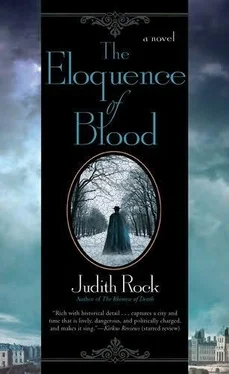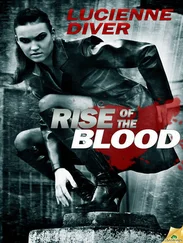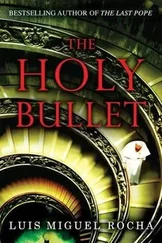Judith Rock - The Eloquence of Blood
Здесь есть возможность читать онлайн «Judith Rock - The Eloquence of Blood» весь текст электронной книги совершенно бесплатно (целиком полную версию без сокращений). В некоторых случаях можно слушать аудио, скачать через торрент в формате fb2 и присутствует краткое содержание. Жанр: Исторический детектив, на английском языке. Описание произведения, (предисловие) а так же отзывы посетителей доступны на портале библиотеки ЛибКат.
- Название:The Eloquence of Blood
- Автор:
- Жанр:
- Год:неизвестен
- ISBN:нет данных
- Рейтинг книги:5 / 5. Голосов: 1
-
Избранное:Добавить в избранное
- Отзывы:
-
Ваша оценка:
- 100
- 1
- 2
- 3
- 4
- 5
The Eloquence of Blood: краткое содержание, описание и аннотация
Предлагаем к чтению аннотацию, описание, краткое содержание или предисловие (зависит от того, что написал сам автор книги «The Eloquence of Blood»). Если вы не нашли необходимую информацию о книге — напишите в комментариях, мы постараемся отыскать её.
The Eloquence of Blood — читать онлайн бесплатно полную книгу (весь текст) целиком
Ниже представлен текст книги, разбитый по страницам. Система сохранения места последней прочитанной страницы, позволяет с удобством читать онлайн бесплатно книгу «The Eloquence of Blood», без необходимости каждый раз заново искать на чём Вы остановились. Поставьте закладку, и сможете в любой момент перейти на страницу, на которой закончили чтение.
Интервал:
Закладка:
“How did Gilles seem when you joined him for Prime?”
Fiennes sighed. “Very upset. His errand had not sped. In spite of all our prayers.”
Very upset. A detail that would not help convince La Reynie that Gilles had done nothing but talk at Martine’s house. Charles was staking everything on the hope that La Reynie would be swayed by Fiennes’s guileless innocence and demeanor. “Is there anyone here in your house who saw Gilles Brion come and go?” Charles said. “And could swear to the times?”
“Oh, yes.”
“Who?” Charles asked skeptically. It was not the answer he had expected.
“My mother’s maid. She has been here for years and knows all about Gilles; she lets him in when he comes. And she’s a very early riser and opened the door for him when he left to go across the river.”
Charles blinked. “Well, what you’ve told me may help your friend. But if you agree to also tell the police, you will be risking hard questions about your connection to Monsieur Brion.”
“There is nothing wrong in our connection, Maitre du Luc. We love each other, yes. We consider ourselves spiritual brothers. Gilles has been tempted to a baser connection with me. But I have persuaded him that it would be grave sin. Now he wants only for us to be near one another and be truly brothers, Capuchin brothers, serving God together. We have nothing to hide.”
“Still, it may not be easy to convince the police of that. They may well be merciless in asking what you did that night.”
Fiennes’s face shone. “We prayed for Gilles. And talked about God. What else would we do?”
Charles found himself speechless and rebuked. The young man’s words rang with truth. He only hoped La Reynie would hear what he heard, and that it would weigh against that damning three-quarters of an hour’s absence. “Will you go to the Chatelet with me when it’s light? If we can get through the snow.”
Fiennes jumped up and went to a window. “It’s not snowing anymore. Though the snow is deep. I will ask my father for horses.”
“Thank you, monsieur. The sooner we get there, the better.” Charles was hoping that Gilles Brion’s long, dark night in the prison had been no more than lonely and uncomfortable, hoping that La Reynie was still holding out against Louvois.
Chapter 22
ST. GENEVIEVE’S DAY, FRIDAY, JANUARY 3
Without the horses, they would never have made it to the Chatelet. Even with them, a ride that should have taken a few minutes took nearly an hour. People wrapped in coats, cloaks, and shawls were wielding brooms and shovels to clear drifted snow from doors, gates, church porches, and streets. It was the Feast of St. Genevieve, the patron saint of Paris, a day full of processions through the city, coiling lines of laymen and clergy chanting and carrying relics and candles. Today, though, the saint’s processions were going to be late beginning, because in most of the streets the snow was still deep and uncleared. As the Chatelet’s white-blanketed roofs and towers rose before them, Charles realized belatedly that Lieutenant-General La Reynie might well not be there. He might simply have decided to stay at home beside his fire in this weather.
The guards at the prison entrance were cold and irritable. The one Charles approached only shrugged and wiped his dripping nose on his sleeve. Cold and largely sleepless, Charles implied harm to the man’s immortal soul if he refused. The guard finally left his fellow holding the entrance and conducted them to La Reynie’s office. An even more irritable voice behind La Reynie’s door called “Come!” when the guard knocked, and Charles released his held breath in a sigh of relief. The guard stalked away. Charles and Fiennes went in.
La Reynie stood in front of a dying fire, rubbing his face. His cloak was on the floor beside one of the armchairs and his wig lay on the other chair’s seat. Startled at this state of undress, Charles wished him a good morning.
“It is not a good morning,” La Reynie growled, raking a hand through his spiky gray hair. “What do you want?” He glanced unhappily at Fiennes. “And who is this?” His frown deepened as he looked more closely at Charles. “What’s happened to you?” He reached out toward the burn holes in Charles’s cloak.
Charles smiled. “Monsieur La Reynie, may I present Monsieur Fiennes? We have been helping the Capuchins fight a fire.”
The two men bowed to each other.
“The Capuchins do well,” La Reynie said, eyeing Fiennes. “I wish we had them all over Paris. And how did you come to be helping them, monsieur?”
“He is soon to be a Capuchin novice,” Charles said, before Fiennes could answer.
La Reynie grunted, glowering at Charles. “And? Have you come to tell me you’re joining the Capuchins, too?”
Charles bit back a reply, taking in the lieutenant-general’s shadowed eyes and limp, wrinkled linen. La Reynie had apparently been up most of the night, too.
“I know now where Gilles Brion was the morning his father died. I have brought Monsieur Fiennes to tell you himself. And there is also another witness to confirm some of what he is going to say.”
La Reynie closed his eyes and swore softly. Then, still without inviting his guests to sit, he went to the door, jerked it open, and bellowed into the passage. “Guillaume! Wine! Bread! Now!” He turned back into the room, swore at the freezing air sweeping through the open door from the passage, went back and slammed the door shut, and dropped into an empty chair.
“Maitre du Luc, put that wig somewhere-no, give it to me, at least it’s warm.” He jammed the wig on his head. “Forgive me, Monsieur Fiennes, please, sit down. I apologize for being somewhat en deshabille this morning. Maitre, bring a chair for yourself.”
Charles went to pull a chair away from the wall and closer to the dead fire.
La Reynie was looking morosely at the cold hearth. “Who would have thought this day could get so much worse, so quickly?” he muttered. He scowled over his shoulder and bellowed “Fire!” at the closed door.
As Charles sat down in the chair he had brought, the door opened and a cheerful, middle-aged servant edged in, carrying a bucket of kindling and balancing a small pewter tray crowded with pitcher, glasses, and a loaf of bread.
“Here you are, mon lieutenant-general.” He put the tray on the table beside La Reynie and knelt in front of the fire. “And just so you know,” he said, poking and prodding the ashes as he looked for live embers, “you’re not here today.”
“I am very glad to hear it,” La Reynie said, sarcasm dripping from his words like melted butter. “Where am I? Am I enjoying myself, wherever it is?”
“I couldn’t say where you are, monsieur, but I’m certain you’re enjoying yourself more than you would be if I’d told Monsieur Louvois’s man you’re here.”
“Blessed saints. Thank you, Guillaume. Every day I am so much deeper in your debt, I will never be able to repay you.”
The man smiled to himself and fell to blowing on a live coal. La Reynie poured wine into the glasses Guillaume had brought, handed two to Charles and Fiennes, and took his own.
“Tell me then, Monsieur Fiennes,” he said resignedly, “this tale that may help to release Monsieur Brion from his present accommodation.”
Fiennes told him. As he talked, La Reynie’s attention sharpened. By the end, he was gazing open-mouthed at the young man.
“You are very frank, monsieur,” he said, when Fiennes had finished. “Either you are far too clever and devious an actor to waste yourself as a Capuchin, or you are so transparent that even the Capuchins may have difficulty coping with you.”
Fiennes simply smiled like a small glowing sun. Watching him, Charles almost imagined that the air grew warm. The lieutenant-general drained his wineglass and reached for the pitcher.
Читать дальшеИнтервал:
Закладка:
Похожие книги на «The Eloquence of Blood»
Представляем Вашему вниманию похожие книги на «The Eloquence of Blood» списком для выбора. Мы отобрали схожую по названию и смыслу литературу в надежде предоставить читателям больше вариантов отыскать новые, интересные, ещё непрочитанные произведения.
Обсуждение, отзывы о книге «The Eloquence of Blood» и просто собственные мнения читателей. Оставьте ваши комментарии, напишите, что Вы думаете о произведении, его смысле или главных героях. Укажите что конкретно понравилось, а что нет, и почему Вы так считаете.












